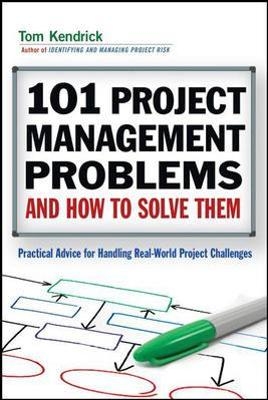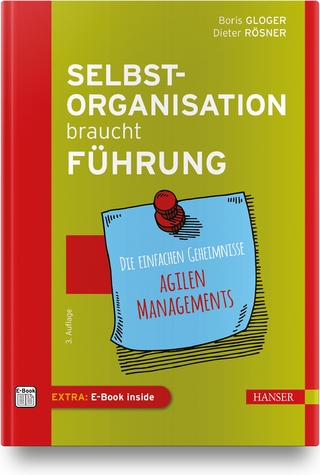
101 Project Management Problems and How to Solve Them
Amacom (Verlag)
978-0-8144-1557-3 (ISBN)
In this helpful how-to, author Tom Kendrick reveals field-proven principles for navigating high-pressure situations, so you can overcome any obstacle.
Even with a terrific project management program in place, problems can arise to derail your team’s hard work. This book explores a wide range of challenging scenarios and practical solutions and is packed with insightful answers to over 100 of your most urgent project management questions.
In 101 Project Management Problems and How to Solve Them, you’ll learn how to:
keep a project on track despite unavoidable interruptions;
how to prevent unreliable outside collaborators from jeopardizing the entire project;
how to manage project teams who have little or no project management experience;
how to make up for lost time without cutting corners;
and how to succeed--even in the face of threatened budget cuts.
The last thing you need in the heat of battle is to dive into project management theories. While there’s no one right answer to the challenges you face as a project manager, 101 Project Management Problems and How to Solve Them has a plethora of actionable guidelines that help you troubleshoot quickly so you can get back to doing what you do best.
Tom Kendrick the former Program Director for the project management curriculum at UC Berkeley Extension, and lives in the Bay area near San Francisco, California. He is a past award recipient of the Project Management Institute (PMI) David I. Cleland Project Management Literature Award for "Identifying and Managing Project Risk: Essential Tools for Failure-Proofing Your Project" (now in it's fourth edition). Tom is also a certified PMP and serves as a volunteer for both the PMI Silicon Valley Chapter and PMI.org.
101 Project Management Problems and How to Solve Them Table of Contents Introduction Part 1: General 1 What personality type fits best into project management? 2 What are the traits of successful project managers? 3 I'm an experienced individual contributor, but very new to project management. How do I get my new project up and going? 4 What are the most important responsibilities of a project manager? 5 What is the value to project management certification? What about academic degrees in project management? 6 There are many project development methodologies. What should I consider when adopting standards such as the Project Management Institute PMBOK? 7 What are the key considerations when developing or revising a project life cycle? What should I consider when choosing between "waterfall" and "cyclic" (or "agile") life cycles? 8 How can I efficiently run mini-projects (less than six months with few dedicated resources)? 9 How rigid and formal should I be when running a small project? 10 How do I handle very repetitive projects, such as product introductions? 11 How should I manage short, complex, dynamic projects? 12 How do I balance good project management practices with high pressure to "get it done?" How can I build organizational support for effective project planning and management? 13 How does project management differ between hardware and a software projects? 14 How many projects can a project manager realistically handle simultaneously? 15 How do I handle my day-to-day tasks along with managing a project? 16 How do I develop and maintain supportive sponsorship throughout a project? 17 What can I do when my project loses its sponsor? 18 How can I secure and retain adequate funding throughout my project? 19 Can the project management function be outsourced? 20 How can I ensure good project management practices during organizational processes changes? 21 What is the best structure for program management for ensuring satisfactory customer results? Part 2: Initiation 22 How do I effectively manage customer expectations? 23 How can I reconcile competing regional/cross-functional agendas? 24 How should I effectively deal with contributor hostility or reluctance during start-up? 25 When is a project large enough to justify investing in a two-day project launch? 26 How do I establish control initially when my project is huge? 27 How should I initiate a new project with a new team, or using a new technology? 28 How should I evaluate and make "make vs. buy" project decisions? 29 How can I quickly engage good contract workers? 30 In a large project, when should I seek commitment for overall funding? 31 When working with extremely limited resources, how can I get my project completed without doing it all myself? 32 How should I initiate a project that has a relatively low priority? 33 How should I organize my Project Management Information System (PMIS) to facilitate access and avoid "too much data?" Part 3: Teamwork 34 How can I organize my team for maximum creativity, flexibility, and success? 35 How can I work effectively with other project teams and leaders who have very little project management experience? 36 How can I help team members recognize the value of using project management processes? 37 How do I keep people focused without hurting morale? 38 How can I involve my team in project management activities without increasing overhead? 39 How can I manage and build teamwork on a project team that includes geographically remote contributors? 40 How do secure team buy-in on global projects? 41 How can I best manage project contributors who are contract staff? 42 How do I cope with part-time team members with conflicting assignments? 43 How do you handle undependable contributors who impede project progress? 44 How should I manage informal communications and "management by wandering around" on a virtual, geographically distributed team? 45 When should I delegate down? Delegate up? 46 How can I best deal with project teams larger than twenty? 47 What can I do to manage my schedule when my project WBS becomes huge? Part 4: Planning 48 How can I get meaningful commitment from team members that ensures follow through? 49 As a project manager, what should I delegate and what should I do myself? 50 Who should estimate activity durations and costs? 51 How do I improve the quality and accuracy of my project estimates? 52 What metrics will help me estimate project activity durations and costs? 53 How can I realistically estimate durations during holidays and other times when productivity decreases? 54 How can I develop realistic schedules? 55 How can I thoroughly identify and manage external dependencies? 56 How do I synchronize my project schedules with several related partners and teams? 57 How do I effectively plan and manage a project that involves invention, investigation, or multiple significant decisions? 58 How should I manage adoption of new technologies or processes in my projects? 59 How should I plan to bring new people up to speed during my projects? 60 How can I resolve staff and resource overcommitments? 61 How can I minimize the impact of scarce, specialized expertise I need for my project? 62 What is the best approach for balancing resources across several projects? 63 How can I minimize potential late project testing failures and deliverable evaluation issues? 64 How do I anticipate and minimize project staff turnover? Part 5: Execution 65 How can I avoid having too many meetings? 66 How can I ensure owner follow-through on project tasks and action items? 67 How do I keep track of project details without things falling through the cracks? 68 How can I avoid having contributors game their status metrics? 69 What are the best ways to communicate project status? 70 How can I manage my project successfully despite high-priority interruptions? 71 What are the best project management communication techniques for remote contributors? 72 How do I establish effective global communications? What metrics can I use to track communication? 73 On fee-for-service projects, how do you balance customer and organizational priorities? 74 How do I survive a late-project work bulge, ensuring both project completion and team cohesion? 75 How do I coordinate improvements and changes to processes we are currently using on our project? Part 6: Control 76 How much project documentation is enough? 77 How can I ensure all members on my multi-site team have all the information they need to do their work? 78 How can I manage overly constrained projects effectively? 79 How do I keep my project from slipping? If it does, how do I recover its schedule? 80 What are the best practices for managing schedule changes? 81 How can I effectively manage several small projects that don't seem to justify formal project management procedures? 82 What are good practices for managing complex, multi-site projects? 83 How do I best deal with time zone issues? 84 How can I manage changes to the project objective in the middle of my project? 85 How should I respond to increased demands from management after the project baseline has been set? 86 How can I avoid issues with new stakeholders, especially on global projects? 87 What should I do when team members fail to complete tasks, citing "regular work" priorities? 88 What is the best way manage my project through reorganizations, market shifts, or other external changes? 89 How should I deal with having too many decision makers? 90 How should I manage multi-site decision making? 91 What can I do when people claim that they are too busy to provide status updates? 92 How can I effectively manage projects where the staff is managed by others? 93 How can I minimize unsatisfactory deliverable and timing issues when outsourcing? 94 How should I manage reviews for lengthy projects? 95 What should I do to establish control when taking over a project where I was not involved in the scoping or planning? Part 7: Tools 96 What should I consider when adopting technology-based communication tools? 97 How should I select and implement software tools for project documentation, scheduling, and planning? 98 What should I consider when setting up a software tool I will be using to coordinate many interrelated projects? Part 8: Closing 99 How should I realistically assess the success and value of my project management processes? 100 What are good practices for ending a canceled project? 101 How can I motivate contributors to participate in project retrospective analysis?
| Erscheint lt. Verlag | 4.6.2018 |
|---|---|
| Sprache | englisch |
| Maße | 153 x 227 mm |
| Gewicht | 281 g |
| Themenwelt | Wirtschaft ► Betriebswirtschaft / Management ► Projektmanagement |
| ISBN-10 | 0-8144-1557-1 / 0814415571 |
| ISBN-13 | 978-0-8144-1557-3 / 9780814415573 |
| Zustand | Neuware |
| Informationen gemäß Produktsicherheitsverordnung (GPSR) | |
| Haben Sie eine Frage zum Produkt? |
aus dem Bereich


